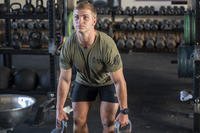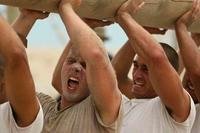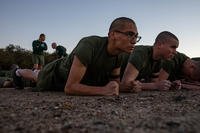You may define work capacity as the ability to keep moving, lifting and carrying objects at a steady pace for a long period of time. If you are discussing work capacity in the fitness arena, you may define it as the ability to recover quickly and use multiple muscle groups requiring your cardiovascular, musculoskeletal and central nervous system to work together efficiently. In physics, Work is defined as force times distance (W = F x d) and is measured in Newton-meters (Nm).
So why is work capacity important in preparation for challenging military training -- everything from basic training to special-ops selection programs?
When you think of preparing yourself physically for any military training program, it will require long days of not just being awake and alert, but actually being in constant movement all day long. A 30- to 45-minute gym workout will not prepare you fully for a day of military training. You have to put in your time moving, as there are no naps at boot camp -- unless you count falling asleep while standing up and waiting in line for a nap.
After noticing recent successful trends as well as recalling similar special-ops success stories, a common denominator becomes glaringly apparent. You need to work all day -- plus work out before, during and/or after a work day --— to be prepared for long, arduous training programs.
For instance, the construction worker who trains an hour or so before work, then works all day lifting, moving and thinking through problems, statistically does well in elite selection programs. Adding a workout during lunch or after work requires a perfect never-quit mindset as well as fuel to burn that many calories a day.
When I recall my own journey, I credit my days in high school when I worked the summer in the watermelon fields in North Florida from 6 a.m. to 6 p.m., loading melons from the field into a semi-truck. That was followed by joining my football team at the weight room for a lifting and sprinting workout to prepare for the fall sports season.
The combination of a long day’s work and vigorous exercise striving to reach a goal has contributed to my successful endeavors. These days required a strong work ethic and created a never-quit attitude I would require for future challenges. The student who works out before school, maybe swims between classes at lunch and gets a run or ruck in before studying late in the evening is preparing his body for the type of long-day training the military provides.
There is actually a work capacity test. Obviously, the definition of work is relative and measuring someone’s ability depends upon their future goals. Here is an example of the Wildland Firefighter Work Capacity Test:
The WCT, known informally as the “pack test,” is a U.S. Forest Service physical test for wildland firefighters.
The information below provides test criteria for arduous, moderate and light duty performance of the WCT:
Arduous pack test: A three-mile hike with a 45-pound pack in 45 minutes.
Moderate field test: A two-mile hike with a 25-pound pack in 30 minutes.
Light walk test: A one-mile hike in 16 minutes.
This is a decent measure of work performance for someone seeking future training in the wildland fire service, but the actual job will require a wide range of movements over rugged terrain, lifting and carrying heavy equipment, and other environmental challenges. Adding a CPAT test to the pack test might help measure the pre-training abilities of the wildland firefighter fully.
The Dirty Dozen Tactical Fitness Test may be a better method to test your ability to perform multiple physical tasks that you will likely see again in your military, police or firefighter profession. The Tactical Fitness Dirty Dozen Test is a 12-event test and takes a few hours to complete if done in a single session.
Do your workouts matter? Obviously. When you are lifting weights, PTing, running, swimming, rucking and putting in the time, you can build a solid work ethic. But continued movement, thinking through problems and “working” throughout the remainder of your day can enhance your abilities to become a productive member of society.
Whether your goals are military, special ops, continuing your education or working for a living, building a strong work ethic and maintaining your work capacity is critical to your success.
Stew Smith is a former Navy SEAL and fitness author certified as a Strength and Conditioning Specialist (CSCS) with the National Strength and Conditioning Association. Visit his Fitness eBook store if you’re looking to start a workout program to create a healthy lifestyle. Send your fitness questions to stew@stewsmith.com.
Want to Learn More About Military Life?
Whether you're thinking of joining the military, looking for fitness and basic training tips, or keeping up with military life and benefits, Military.com has you covered. Subscribe to Military.com to have military news, updates and resources delivered directly to your inbox.


















